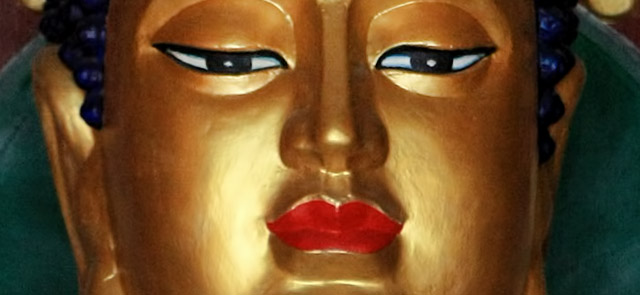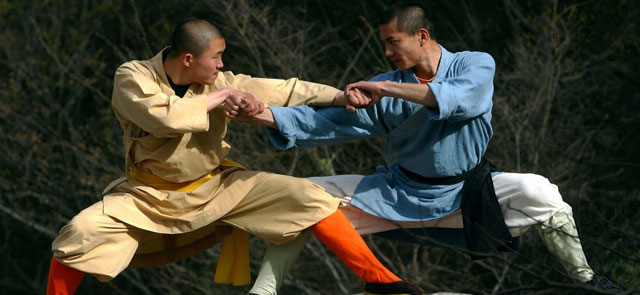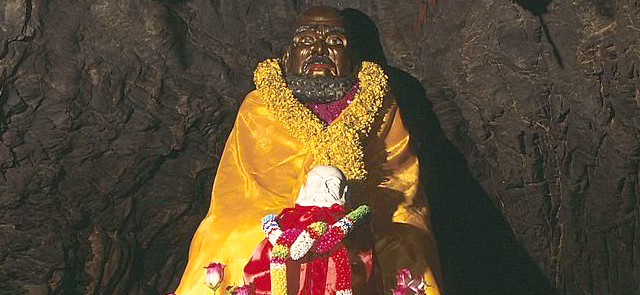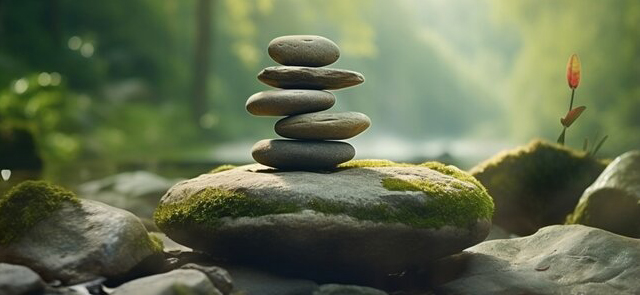Samadhi, the state of calm attained by meditation practice, has many levels depending on the degree of absorption of the Mind with the object of meditation. The word, Mind, means the mind, heart or consciousness; it is the basis in a person, which is "central", whereas everything else, including the five Skhandas is peripheral. Practically everyone has to develop the practice of samadhi, if they want to attain wisdom and a state of happiness beyond what is normally possible in this world. Having attained samadhi, the way is then clear for the development of wisdom.
Wisdom does not simply mean intellectual thought; it is of quite a different order and can only arise from an internal state of calm. Therefore, the first necessity of mental training is to attain a state of calm.Developing samadhi can be put like this. Normally, the heart is hungry, it wants something, and it is searching around all the time. The only way it knows how to search is through the senses and in the world, because this is what it has learnt. It wants this, searches for that, looks for this, wants to hear that - and so on, all the time. It goes out continually, but what it gets from the world and what it gets by doing this never satisfies the hunger. In fact it tends to increase it if anything. The heart is still hungry after the entire searching one has done.
Master Shi Yan Zhuo
Now the way to satisfy the heart is not by going out, but by going in the opposite direction. One must withdraw one's attention away from sense stimuli, memory and thoughts - both discursive and playful - and one must give the mind as little as possible to hold onto. One allows one's attention to remain only with the subject of meditation, such as the repetition of "Buddha's Name" , or watching one's breathing. The mind is given only this one thing to hold onto, one anchor.
At first it is very difficult for the mind still wanders and jumps about but, as one goes on, it becomes more used to it and interest starts to arise. When interest arises there is less tendency to run around. You have probably noticed this with work; how, when you had something, which at first you did not want to do, when you got deeply into it the work started to become interesting. After that, it was no longer such a hard task. It was much easier and could be done without much hardship.
It's like that with meditation practice. At first it's hard work, but once you get into it then interest arises and, once that happens, the mind becomes more and more absorbed in the practice. When it becomes absorbed, the external things all start dropping away automatically. The mind goes right inward, and when it goes inward and stays there, it gets complete rest and the heart is fulfilled internally and feels quite satisfied. When it comes out of that state, it no longer wants to search around looking for things, because it is satisfied. It is prepared to remain just there - still.
Withdrawing from this state of absorption the mind is replete, satisfied, as though it has had a good meal. It is also wieldy and pliable; this state can be turned to good advantage by developing wisdom, because the main obstacles to its development are quelled for a time. Instead of being restless, fluctuating and wandering, the mind is in a suitable state which can be used for investigation, and it can go very, very deep. This is true wisdom and this wisdom brings results.
In the normal way of life, it is possible for one to have insight and gain a lot of understanding by using reason and discursive thought. Sometimes one may feel that such insights are deep and important, for they may reveal things about life and people which one had never realised before. Yet when one reviews that understanding, it does not really have much effect on oneself internally; it is, so to speak, on the surface. It may be quite true, but it does not alter one's outlook or nature.
To give an illustration: the type of understanding that does alter one's nature is like that of a young child who sees something hot, like a red hot coal, and he goes to pick it up. Once he touches it, he never does it again. He learns quickly and deeply - it penetrates, it is effective. That sort of wisdom is not easily lost. However, the wisdom which we must work for is of a much more subtle nature, and can only be attained when we have a basis of Samadhi. In Samadhi, the heart is still, it's open, and whatever is penetrated by wisdom will go straight into it.
Normally, the heart is covered over with all sorts of garbage as though it's wrapped up and nothing can get through, but when samadhi is developed the heart can be reached quite easily. It is quite open, and whatever wisdom is developed goes right in. That wisdom is then effective in giving results. It can be effective in quite extraordinary ways - it can even reverse long-standing habits of people quite easily.
Those obstructive qualities, which are like "sand in the gears", are called klesas [Chin.: fánn?o ?? | Sansk.: ????? kle?a] or defilements. They wrap around the heart and prevent the calm from penetrating. They are the things, which we have to try and get rid of, and they are the things, which we must come to know. Mainly, they consist of greed, hatred and delusion, but there are a whole heap of other things, which spring from these three. They have endless ramifications and endless tricks too, they trick us in all sorts of ways.
Let me give an example: when doing meditation practice and a thought arises - something not very good - one might catch it, and then think, "I've caught that one, the klesas didn't get me there." So then one congratulates oneself, but while congratulating oneself one does not realise that this is also kilesa, and one has been caught in another direction!
These are the sort of tricks that they play all the time. One must learn their tricks and be up to them all the time with understanding. One must not think that these klesas are little things, which are just tacked onto oneself somehow. They are extremely important and are very deep in the heart. It is just these klesathat cause all the trouble in the world - nothing else. Atomic bombs don't let themselves off, they require people to do so; bullets are not fired from guns without people behind them; and what is behind each person is his own klesas all the time.
So the whole trouble in the world springs from these klesas, which are quite subtle, extremely resourceful and ever-present. They are resourceful because they dwell there in each person's own heart [Chin.: x?n ? | Sansk.: ????? citta], which they usurp. They use its inherent cleverness to further their own ends.
The klesas are there in the heart, and Dharma [Chin.: fóf? ?? | Sansk.: ???? Dhrama] is there also, all mixed up; it depends on circumstances which one dominates at any one time. These klesas are there in the heart all the time, and so they are continually flowing out and displaying themselves in action, speech and thought. In fact, we could say that the average person is almost entirely the kilesas. It is not that sometimes they are there and sometimes they are not - they are there all the time, colouring our outlook, causing our understanding to be deluded. Our basic perceptions of the world, other people, ourselves, religion and endless other things are all distorted, because they all come under the baneful influence of kilesas.
For this reason, everything that we do in ordinary life is to some extent, false or wrong. There is nothing that we can do perfectly, until we get rid of the kilesas. However, we must not be too worried about this because, although everything we do is false, there are two ways in which we can go; there is one way that is wrong, and another that is right. What we must learn is how always to choose the right direction, even though it may be far from perfect and coloured by these kilesas.
If we go in the right direction, the klesas steadily get thinner, and the understanding that undermines them gets stronger. However, if we go in the wrong direction, we become more deluded and more caught up until there is no hope in anything. You only need to look and see people who do bad things and see what they become. They become coarse and gross, and they don't understand anything subtle at all. This is because their klesas are growing fast, because they are going in the wrong direction all the time. Those people who go in the right direction gain happiness, as if there was an aura of happiness around them all the time. They are not concerned about things, and they don't worry like other people do. The world to them is not an unpleasant place; all the problems in it do not really touch them, because they are good inside. This is because the troubles in the world are always troubles in oneself, while external troubles are mere occurrences, which just take place. It is within one's own internal state that all troubles exist and, if one can only learn to cure oneself, all troubles and problems will recede into the background.
As to the details of what you should do, you know already what is meant by meditation practice, and you should try to maintain whichever technique you find works best. As far as wisdom is concerned, it is good to use wisdom in the sense of thinking about things, seeing how things work in the world and in one's life. Steadily this does have an effect, although it is slow and takes a long time to penetrate deeply. In other words, thinking about the right kind of things in the ordinary way of thinking can develop wisdom but only very slowly, for it takes a long time to penetrate internally in depth. Generally speaking, there is little alternative to the development of Samadhi.
In the training of the mind there is the need to develop wisdom. Unfortunately, this cannot be done directly, just by wanting wisdom.
Master Shi Yong Po






